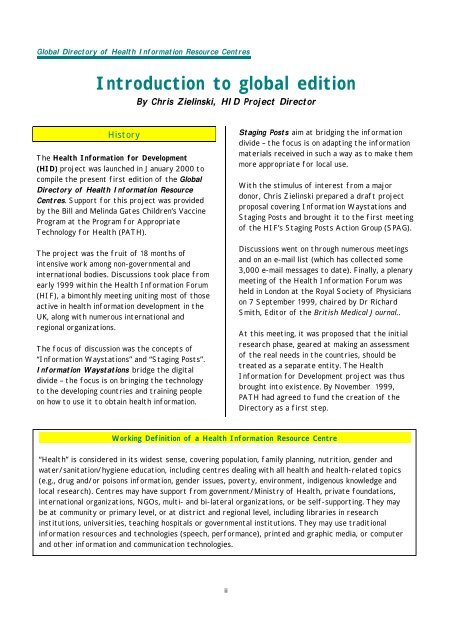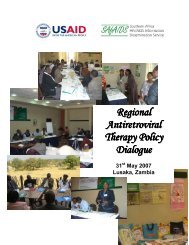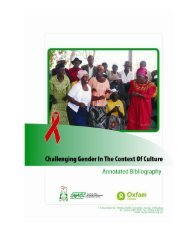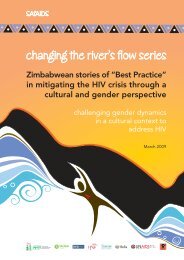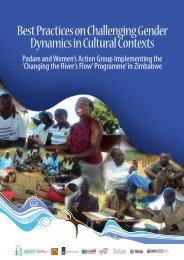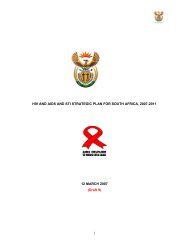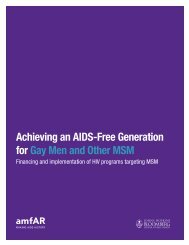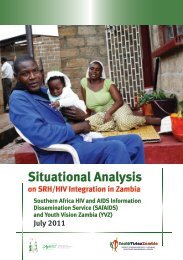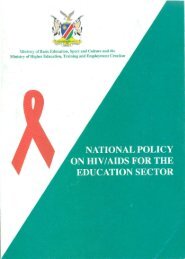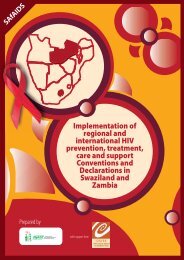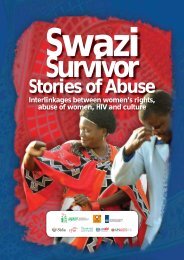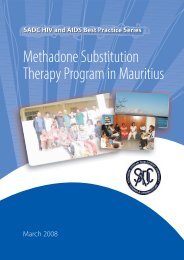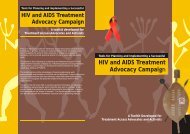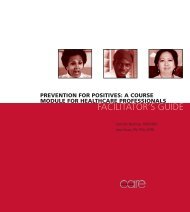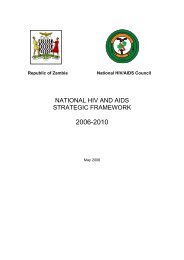African Directory of Health Information Resource Centres - SAfAIDS
African Directory of Health Information Resource Centres - SAfAIDS
African Directory of Health Information Resource Centres - SAfAIDS
You also want an ePaper? Increase the reach of your titles
YUMPU automatically turns print PDFs into web optimized ePapers that Google loves.
Global <strong>Directory</strong> <strong>of</strong> <strong>Health</strong> <strong>Information</strong> <strong>Resource</strong> <strong>Centres</strong><br />
Introduction to global edition<br />
By Chris Zielinski, HID Project Director<br />
History<br />
The <strong>Health</strong> <strong>Information</strong> for Development<br />
(HID) project was launched in January 2000 to<br />
compile the present first edition <strong>of</strong> the Global<br />
<strong>Directory</strong> <strong>of</strong> <strong>Health</strong> <strong>Information</strong> <strong>Resource</strong><br />
<strong>Centres</strong>. Support for this project was provided<br />
by the Bill and Melinda Gates Children’s Vaccine<br />
Program at the Program for Appropriate<br />
Technology for <strong>Health</strong> (PATH).<br />
The project was the fruit <strong>of</strong> 18 months <strong>of</strong><br />
intensive work among non-governmental and<br />
international bodies. Discussions took place from<br />
early 1999 within the <strong>Health</strong> <strong>Information</strong> Forum<br />
(HIF), a bimonthly meeting uniting most <strong>of</strong> those<br />
active in health information development in the<br />
UK, along with numerous international and<br />
regional organizations.<br />
The focus <strong>of</strong> discussion was the concepts <strong>of</strong><br />
“<strong>Information</strong> Waystations” and “Staging Posts”.<br />
<strong>Information</strong> Waystations bridge the digital<br />
divide – the focus is on bringing the technology<br />
to the developing countries and training people<br />
on how to use it to obtain health information.<br />
Staging Posts aim at bridging the information<br />
divide – the focus is on adapting the information<br />
materials received in such a way as to make them<br />
more appropriate for local use.<br />
With the stimulus <strong>of</strong> interest from a major<br />
donor, Chris Zielinski prepared a draft project<br />
proposal covering <strong>Information</strong> Waystations and<br />
Staging Posts and brought it to the first meeting<br />
<strong>of</strong> the HIF’s Staging Posts Action Group (SPAG).<br />
Discussions went on through numerous meetings<br />
and on an e-mail list (which has collected some<br />
3,000 e-mail messages to date). Finally, a plenary<br />
meeting <strong>of</strong> the <strong>Health</strong> <strong>Information</strong> Forum was<br />
held in London at the Royal Society <strong>of</strong> Physicians<br />
on 7 September 1999, chaired by Dr Richard<br />
Smith, Editor <strong>of</strong> the British Medical Journal..<br />
At this meeting, it was proposed that the initial<br />
research phase, geared at making an assessment<br />
<strong>of</strong> the real needs in the countries, should be<br />
treated as a separate entity. The <strong>Health</strong><br />
<strong>Information</strong> for Development project was thus<br />
brought into existence. By November 1999,<br />
PATH had agreed to fund the creation <strong>of</strong> the<br />
<strong>Directory</strong> as a first step.<br />
Working Definition <strong>of</strong> a <strong>Health</strong> <strong>Information</strong> <strong>Resource</strong> Centre<br />
“<strong>Health</strong>” is considered in its widest sense, covering population, family planning, nutrition, gender and<br />
water/sanitation/hygiene education, including centres dealing with all health and health-related topics<br />
(e.g., drug and/or poisons information, gender issues, poverty, environment, indigenous knowledge and<br />
local research). <strong>Centres</strong> may have support from government/Ministry <strong>of</strong> <strong>Health</strong>, private foundations,<br />
international organizations, NGOs, multi- and bi-lateral organizations, or be self-supporting. They may<br />
be at community or primary level, or at district and regional level, including libraries in research<br />
institutions, universities, teaching hospitals or governmental institutions. They may use traditional<br />
information resources and technologies (speech, performance), printed and graphic media, or computer<br />
and other information and communication technologies.<br />
ii


